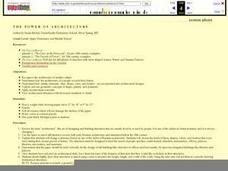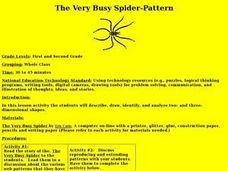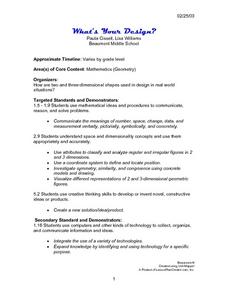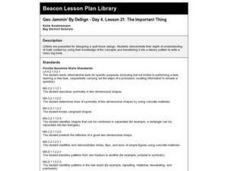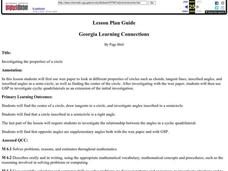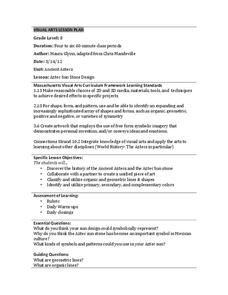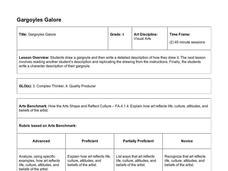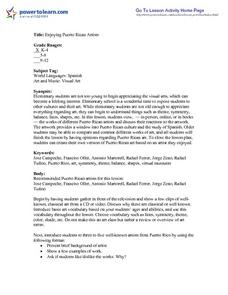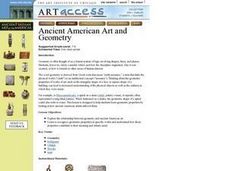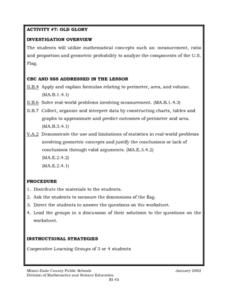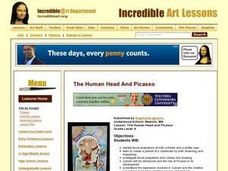Curated OER
T H E P O W E R O F A R C H I T E C T U R E
Young scholars arecognize the architecture of another culture, how the architecture of a people records their history, explore artistic elements, explore and use geometric concepts of shape, pattern, and symmetry.
Curated OER
Geometry in Tessellations
Young scholars examine tessellations and their geometric properties. Students explore the concept of tessellations and lines, planes, angles, and polygons. Young scholars experiment with the area and perimeter of polygons. Students...
Curated OER
The Delta Flier
Students make calculations in order to construct a kite in the shape of an isosceles right triangle. In this kite lesson plan students calculate altitude of their flying kites using a formula.
Curated OER
Introduction to Fractals: Infinity, Self-Similarity and Recursion
Students think about several of the concepts from fractals, including recursion and self similarity. They use mathematical concepts of line segments, perimeter, area and infinity are used, and skill at pattern recognition is practiced.
Curated OER
Radial Design Mandala
Students design original radial art designs.In this radial design instructional activity, students use compasses and a nature inspired idea to create radial art. Students understand the use of symmetry, balance and design shapes in...
Curated OER
The Very Busy Spider-Pattern
Young scholars explore two- and three-dimensional shapes. In this very busy spider lesson, students read the story and then create a spider web pattern of their own. The webs must use a symmetrical pattern. Additional...
Curated OER
Friendship Quilt
Third graders name different kinds of shapes and then discuss what they know about them an what they would like to learn using a K-W-L chart whole group. They listen to the book, THE GREEDY TRIANGLE and then retell it to the class. They...
Curated OER
Tree of Life Mandala Print
Students create a Tree of Life. For this visual art lesson, students explore mandalas. Students investigate the concepts of balance and symmetry while designing their own unique Tree of Life.
Curated OER
What's Your Design?
Sixth grade students: design a stained glass window, submitting their initial plan detailing the measurements of all lines and angles. Seventh grade students: create a scale drawing of their own geometric family of four members.
Curated OER
Comparing and Contrasting
Young scholars practice compare and contrast skills. In this science and language development lesson, students complete a T chart generating traits of a snail and a clam. Young scholars complete a related worksheet.
Curated OER
Governor's Garden
Students review types of polygons and list several examples of each. They assume the role of a landscape artist interviewing for a job. They create sketches of their plans for six polygonal gardens and write an expository paragraph...
Curated OER
Geo Jammin By Design: The Important Thing
Students brainstorm what they know about geometric terms and patterns. They identify symmetry, shapes and congruency. They create a book of symmetry.
Curated OER
Investigating the properties of a circle
Students use wax paper to look at different properties of circles such as chords, tangent lines, inscribed angles, and inscribed angles in a semi-circle, as well as finding the center of the circle, and use GSP to investigate cyclic...
Curated OER
Origami Frogs
Ninth graders explore a variety of geometry and science concept while making an origami frog. The fold paper into the shape of a frog and conduct measurement activities including frog leaps.
Dick Blick Art Materials
Start with a Circle...
The Golden Ratio. The Divine Proportion. Yup. It's math and art blended into one colorful activity. Young artists combine colored tissue paper circles and parts of circles to create geometric patterns. As a bonus, kids get to figure out...
Curated OER
Ancient Aztecs
Is it a calendar? A religious symbol? A political statement? One thing for certain is that Aztec sun stone designs remain an important symbol in Mexican cultural art. Young artists craft their own Aztec Sun design incorporating ideas...
Hawaiʻi State Department of Education
Gargoyles Galore
Grrrrr, gargoyles are on the loose! Young artists are familiarized with the history of gargoyles, examine pictures of them, and hear a story about them. Then, they draw a gargoyle and write down exactly how they did it (procedural...
Curated OER
Drawing to Scale
Students examine the process of drawing a picture to scale. They analyze and discuss real-life blueprints for a house, and create a scale drawing of an original invention using calculators and rulers.
EngageNY
Analyzing a Graph
Collaborative groups utilize their knowledge of parent functions and transformations to determine the equations associated with graphs. The graph is then related to the scenario it represents.
Curated OER
Enjoying Puerto Rican Artistts
Students examine artwork done by artists from Puerto Rico. As a class, they discuss each piece of work based on the elements used. They use the internet to research the lives of the artists and develop their own opinions on the art...
Curated OER
Ancient American Art and Geometry
Students explore the relationship between geometry and ancient American art. They see how to recognize geometric properties in specific works and explain how these properties contribute to their meaning and artistic merit.
Curated OER
Old Glory
Students utilize mathematical concepts such as: measurement, ratio and proportion and geometric probability to analyze the components of the U.S. Flag. They collect, organize and interpret data by constructing charts, tables and graphs...
Curated OER
The Human Head and Picasso
Sixth graders view human head paintings by Picasso. Using the paintings, they identify the facial proportions by a frontal and profile view. With a partner, they create a portrait of them after observing and measuring their face. They...
Curated OER
Triangle Inequality
Students discover that the sum of the lengths of any two sides of a triangle must be greater than the third side. They are shown how a triangle is formed using three strips such as that the triangle is seen inside the strips.
